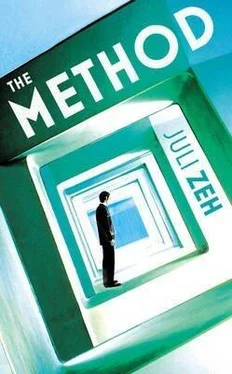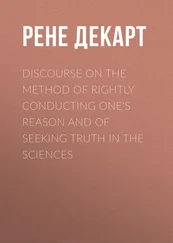‘Microbes don’t have legs.’ Mia poked him in the ribs. ‘Actually, we’re making good progress. Once I’ve—’
‘Look out!’
Mia stiffened as her brother dropped his rod and grabbed her by the shoulders. There was rustling from the undergrowth on the opposite bank.
‘Over there!’ shouted Moritz in mock panic. ‘A great big bacteria with pointed horns!’
‘Don’t be an idiot!’ Mia laughed and wiped her brow. ‘It was only a deer.’
‘Precisely.’
‘I don’t suppose I’ll ever understand what you want from life.’
‘That reminds me … Want to hear something? It’s especially for you.’
Moritz reached for his hygiene mask, which was hanging around his neck, and placed it on his head like an Alice band; then he picked up his rod.
‘In my dreams,’ he intoned, ‘I see a city made for living, where the houses have rusty antennae like spiky hair. Where owls live in the beams of tumbledown attics. Where loud music and twisting ciphers of smoke rise from the upper floors of dilapidated factories, accompanied by the hearty clunking of billiard balls. Where every street lamp seems to shine on a prison yard. Where bicycles are parked in bushes and people drink wine from dirty glasses. Where young girls wear the same denim jacket and walk around hand in hand as though they’re scared. Scared of other people. Scared of the city. Scared of life. Here, in this city, I run barefoot across building sites and watch the mud rising up between my toes.’
‘Infantile and revolting,’ said Mia. ‘Whoever wrote it should be locked up.’
‘Exactly what the judge thought,’ said Moritz. ‘Eight months for sedition.’
He hooked a cigarette out of his shirt pocket and pushed it between his lips. Mia’s hand shot out and whisked it away.
‘Where did you get hold of that?’
‘Honestly, Mia,’ said Moritz. ‘Where do you think? I don’t suppose you brought a light?’
WHEN DRISS WAS little, she wanted to grow up like Mia. Now she is fully grown and sitting at the top of the stairs barely two paces from Mia’s door, beneath which lies a mat, placed there as a tribute to a bygone age. Driss knows exactly where to sit in order to get the best view from the top-floor window. The apartment block is built on a slope, and the city lies at Driss’s feet. It is an excellent place for dreaming. Most people don’t come up this far, but Driss has brought a bucket and a bottle of disinfectant, just in case.
Her dreams unfold in two-dimensional Technicolor, like old-fashioned films. She usually casts Mia in the lead. Today, for example, she is watching Mia introduce herself to Kramer behind this very door. At first Driss doesn’t really understand the conversation, despite Pollie’s efforts to read to her regularly from The Healthy Mind . Kramer seems to be talking about the battle against the People’s Right to Illness: he has chalked up some important victories in the anti-terrorist campaign. Lizzie’s voice has a habit of rising half an octave when the PRI is in the headlines, but Mia listens quietly and asks a few questions. Kramer has never met anyone who understands him so well.
After a while, they fall silent. Driss likes to replay this moment in her head. She zooms in and watches at half-speed as Mia and Kramer, who are sitting side by side on the sofa, turn to each other slowly. They don’t gaze into each other’s eyes; each is focused on the other’s mouth. Kramer puts an arm around Mia. If Driss were to do the same, her fingers would touch the white front door of Mia’s apartment. She feels the hairs on her slender neck stand on end, she closes her eyes and holds her breath. In a moment, Kramer will lean forward and kiss Mia as people used to in movies when they didn’t know about the risk of oral infection.
Driss feels a tingling in her nostrils. She opens her eyes and sniffs. There is a strange smell. She scans the landing and takes two more vigorous sniffs. No doubt about it: smoke. In an instant she is on her feet and racing down the stairs.
‘Fire!’ she shouts. ‘Fire!’
At the end of the landing, behind the white door, Mia is lying on the sofa with the ideal inamorata, a cigarette between her lips and a blackened match on her thigh.
‘This is it,’ says Mia, taking a long drag on the cigarette, ‘this is exactly how Moritz smelt.’
‘You’d think he were here,’ says the ideal inamorata, reaching out two fingers to take the cigarette.
DRESSED IN HER black robes, Sophie looks not unlike a nun without a veil. She has come to accept the likeness and knows it could be worse. At least when she puts the statute book under her bottom she no longer looks like a nun who’s too small for her chair. The furniture in the courtroom dates back to an era when judges were more stately. The problem is exacerbated by the ergonomic guidelines for workplace safety, which haven’t been properly adhered to. On some days, admittedly few in number, Sophie hates her job.
Barker is thin and nervous today, as though his robe is concealing a bag of loose bones. The private counsel, this time in mufti, is alone in the public gallery, staring out of the window, apparently uninvolved. The clerk has got a new hairstyle — or maybe her grandma has come to the courtroom instead. She scans the defendant’s arm: Mia’s chip is in the same place as everyone else’s, in the middle of the bicep, just beneath the skin. Sophie refreshes herself with oral disinfectant, ascertains the identity and presence of the various parties, and opens the hearing with the words: ‘Is this your idea of a joke?’
‘No, Your Honour,’ says Mia, her face expressionless.
‘Two days ago, you gave me your word. Do you remember what you promised?’
‘Yes, Your Honour.’
‘Do you know why you’re here?’
‘Abuse of toxic substances,’ interrupts Barker for the prosecution. ‘In contravention of Article 124 of the Health Code.’
Sophie places both hands on the lectern and leans forward as she fixes Mia with an angry glare. ‘This isn’t a conciliatory hearing,’ she hisses. ‘No discussion or mediation. You’re a defendant, not a respondent. This, Frau Holl, is a criminal trial.’
This time Sophie’s angry face appears for longer. It looks out of place with her ponytail.
Mia says nothing.
‘What did we discuss two days ago?’
Mia still says nothing.
‘Do you think I’m stupid? Is this a game to you? Answer me, Frau Holl!’
Mia tries to answer. She looks up, fills her lungs with air and opens her mouth. She would like to give the right answer, not least because she wants to please the nice judge. But the right answer won’t come to her, and this is a terrible shock for Mia, as if she has suddenly realised that something fundamental about her life has changed. In Mia’s world, it is customary for there to be an answer to each question or to be precise, one correct answer to every question. In Mia’s world, a person’s mind doesn’t slosh like water around her head.
‘Moritz,’ she says, and the voice seems to come from somewhere else in the room, ‘Moritz said smoking a cigarette is like journeying through time. It transported him to other places … places where he felt free.’
‘The prosecution moves for the defendant’s comments to be noted in her file,’ says Barker.
‘Rejected,’ says Sophie. ‘The defendant’s statement shall be heard in full.’
‘Forgive me, Your Honour,’ says Barker with a special smirk: the same smirk he brought out for Sophie when he was arguing with her at law school, ‘I was under the impression the court would be bound by the rules of criminal procedure.’
Читать дальше












